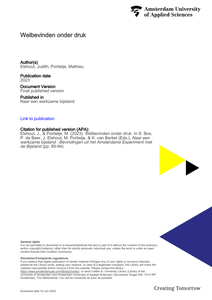In dit artikel wordt een analyse gemaakt van trends in de toeristische aankomsten naar het eiland mauritius en wordt een prognose gemaakt voor toertsieche aankomsten in de komende jaren.
DOCUMENT
Artikel over de economische efefcten van de bouw van het Sportiom in Den Bosch. Het artikel presenteert methoden om van een investering in een toeristische site als het Sportiom de Inkomens en Capaciteitsefefcten te meten.
DOCUMENT
In dit artikel wordt een empirisch model gebaseerd op de aankomsten van toerisme in Amsterdam ontwikkeld en getest.
DOCUMENT
Bewerking van een artikel over inkomend toerisme in Oostenrijk. Wordt thans gebruikt in diverse PhD workshops.
DOCUMENT
Our ageing population is the result of two demographic trends: decreasing fertility levels and higher life expectancy. As a corollary to these demographic trends, the working population is ageing and shrinking at the same time. This development will affect the performance of organizations in the next decades. As today‟s economy and the performance of organizations is mainly based on knowledge, the ageing workforce will mainly affect the organizations ability to be knowledge productive. As current knowledge management (KM) and intellectual capital (IC) literature hardly addresses the issue of ageing, the aim of this paper is to explore this topic in order to formulate an agenda for further KM/IC research. Combining the temporary consequences of ageing (brain drain and talent gap) and the false assumptions about the capabilities of older workers (older workers contribute negatively to a firm‟s performance), the current ageing of the working population reveals two main risks for organizations and management: underutilization of older employees, and loss of knowledge. Based on the exploration of these two risks in this paper, several issues are proposed for further research. These issues focus on the specific competences of the older knowledge worker, the implications for talent development programs, the benefits of inter-generational learning, and effectiveness of knowledge retention strategies. Today, the main fear is that large scale retirement will lead to a shortage of skills, talents, knowledge. Although acknowlegding the risks and threats of this brain drain, the current temporary ageing of our workforce might also contribute to a structural better valuation of the potential of the older knowledge worker and its specific contribution to the process of knowledge creation. In an ageing knowledge economy, increased understanding about the abilities and distinct qualities of older workers will provide opportunities for organizations to enhance knowledge productivity and thus gain competitiveness.
DOCUMENT

In dit krantenartikel wordt verslag gedaan van mijn werkzaamheden op diverse festivals, met als doelstelling het in kaart brengen van bestedingseffecten dmv verschillende methoden en technieken.
DOCUMENT
In zijn boek 'Stop deze depressie nu' constateert Nobelprijswinnaar Paul Krugman dat economen een deel van de economische crisis zijn geweest, en niet van de oplossing. Martijn van der Heide, lector Geïntegreerd Natuur- en Landschapsbeheer bij Hogeschool VHL, pleit er in zijn essay 'Speuren naar het goede leven' voor om de economische wetenschap weer de wetenschap te maken zoals die oorspronkelijk was: een sociale wetenschap waarin alles draait om het dagelijks handelen van mensen. Het essay van Martijn van der Heide is op 18 januari 2014 verschenen in Trouw.
DOCUMENT

As labour is becoming more and more knowledge controlled, it also getting closer to the individual person. We sometimes seem to forget this. To an increasing extent it is becoming a part of oneself and therefore of the personal identity. The increasing humanization of labour asks for an HRM-policy and an organizational context in which the individual is able to identify with the organization, colleagues, customers/clients and product. Heterononimous or abstract organizations, organizations in which the employees and civilians have been reduced to numbers and in which there is no real consideration for the individual differences, have to make way for organizational structures in which the individual feels (self) responsible again. The future lies with personal, tribally inspired organizations in which managers will be leaders and where employees and managers can show social commitment. Images like that of: the egocentric boss who by making swift career moves avoids responsibility for employee/co-worker and customer/client; of colleagues taking the day off without consultation or who are putting their phone through to someone else without saying so beforehand, meeting rooms which are not being cleaned up after use and the image of a Xerox machine not being refilled up with paper by anyone, are all too frequently dismissed as not being part of productivity.
DOCUMENT

De bestuurlijke informatievoorziening voor het tactische en strategische management kan tegenwoordig tot stand komen op basis geavanceerde Executive Information Systems (EIS). Maar 'bestuurlijke informatievoorziening met EIS' vraagt om essentiele basiskennis omtrent besturen en bestuurlijke informatie binnen organisaties. In dit artikel staan met name de toepassing van de tools centraal.
DOCUMENT

Wie moet leven van een bijstandsuitkering heeft het financieel gezien niet makkelijk. De precaire situatie waarin betrokkenen zitten, kan grote invloed hebben op hun welbevinden, oftewel: op hun tevredenheid over het leven (Layard, 2005; Veenhoven, 2002, in Van Echtelt, 2011). Los van beperkte financiële middelen kunnen ook andere factoren een rol spelen, zoals het gevoel niet ‘echt’ mee te doen in de samenleving, de ervaren gezondheid, het ontbreken van een perspectief en zorgen over de toekomst.
DOCUMENT
